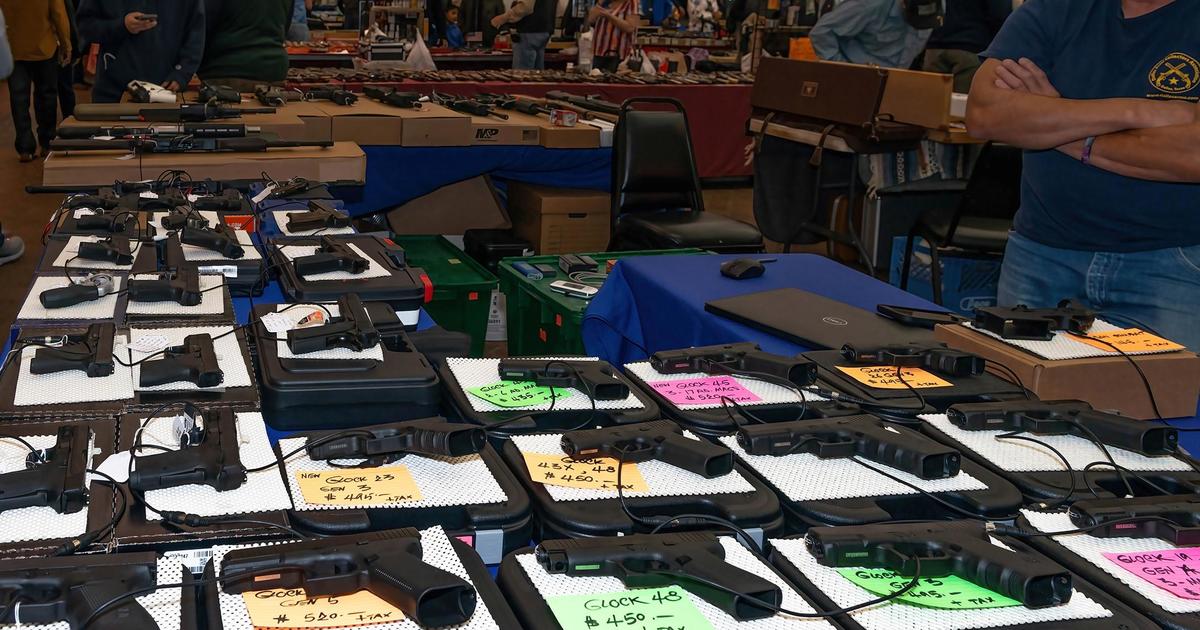
The Justice Department announced a new rule that mandates anyone selling guns to conduct federal background checks, closing the 'gun show loophole' and expanding the definition of being 'engaged in the business' of firearms sales. This rule covers sales at gun stores, flea markets, on social media, and at gun shows, impacting approximately 23,000 unlicensed dealers and potentially tens of thousands of gun sales annually. The aim is to enhance gun sale traceability, including in crime investigations, stemming from a clarification under the Bipartisan Safer Communities Act signed by President Biden.

The Bipartisan Safer Communities Act is a United States federal law, passed during the 117th United States Congress. It implemented several changes to the mental health system, school safety programs, and gun control laws. Gun control laws in the bill include extended background checks for firearm purchasers under the age of 21, clarification of Federal Firearms License requirements, funding for state red flag laws and other crisis intervention programs, further criminalization of arms trafficking and straw purchases, and partial closure of the boyfriend loophole. It was the first federal gun control legislation enacted in 28 years.The bill was introduced by Senator Marco Rubio (R–FL) on October 5, 2021, as an unrelated bill, then modified by an amendment by Senator Chris Murphy (D–CT) on June 21, 2022, and signed into law by President Joe Biden on June 25, 2022.

The boyfriend loophole is a gap in American gun legislation that allows physically abusive ex-romantic partners and stalkers with previous convictions or restraining orders to access guns. While individuals who have been convicted of, or are under a restraining order for, domestic violence are prohibited from owning a firearm, the prohibition only applies if the victim was the perpetrator's spouse or cohabitant, or if the perpetrator had a child with the victim.The boyfriend loophole was introduced in 1996 with the Lautenberg Amendment, which established stricter gun control restrictions in the United States in order to combat domestic abuse. This law included a definition of an "intimate partner," who would be prohibited from accessing guns, but it did not encompass certain dating partners.Both before and after the introduction of the boyfriend loophole, there were attempts to increase governmental action in relation to domestic abuse, but they were unsuccessful, on constitutional grounds.More recently, researchers have found a positive correlation between intimate partner violence and firearm access. Additionally, researchers have studied the overlap between instances of domestic abuse, stalking, and shootings.Although the boyfriend loophole has a direct effect on people who experience domestic abuse or stalking by former or current intimate partners, women disproportionately face intimate partner violence, so they are disproportionately impacted by the boyfriend loophole.Current legislation aimed at combating intimate partner violence includes the Violence Against Women Act, which was reauthorized on March 16, 2022, as well as the Bipartisan Safer Communities Act, which was signed into law on June 25, 2022. This federal legislation significantly narrows the boyfriend loophole, denying access to firearms for five years to people convicted of violence in dating relationships. However, this restriction does not apply to those who only have restraining orders.

A federal judge scolded the Justice Department for instructing two employees not to comply with subpoenas in the Hunter Biden investigation led by House Republicans. The Justice Department's refusal to allow attorneys to testify drew criticism from U.S. District Judge Ana Reyes, who pointed out the hypocrisy of prosecuting others for similar actions. The subpoenaed attorneys, Mark Daly and Jack Morgan, are involved in a long-running probe into Hunter Biden's activities. The judge ordered negotiations between the House Judiciary Committee and the Justice Department to resolve the issue out of court.

The New York Secure Ammunition and Firearms Enforcement Act of 2013, commonly known as the NY SAFE Act, is a gun control law in the state of New York. The law was passed by the New York State Legislature and was signed into law by Governor of New York Andrew Cuomo in January 2013. The legislation was written in response to the Sandy Hook Elementary School shooting in Newtown, Connecticut, and the Webster, New York, shooting. Cuomo described the law as the toughest gun control law in the United States.The NY SAFE Act contains a number of firearms regulations. It also contains a severability provision that allows other measures to remain in place in case the broad prohibitions against weapons are invalidated by the courts.





CBS News

Washington Post

Yahoo! News

https://apnews.com/author/alanna-durkin-richer

NPR

https://www.theguardian.com/profile/richardluscombe

The Huffington Post

Paul Farrell

Wikipedia

Wikipedia

PANORA

Wikipedia